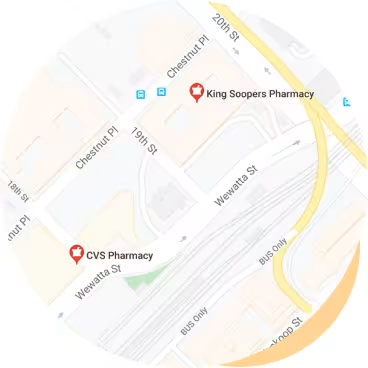Medrol dose pack (methylprednisolone) available online
Short courses of Medrol steroid dose packs help reduce inflammation for a range of conditions, from severe allergies to flare-ups of certain forms of autoimmune arthritis. Don't let inflammation dictate your day-to-day. Consult with our board-certified doctors today to find out if a Medrol pack is the right solution for you.*
Book an appointmentExperience relief within hours
Reduces redness and inflammation
Tailored doses for each patient
*Prescriptions are provided at the doctor’s discretion. Learn more about our controlled substances policy and how to save up to 80% with our prescription discount card.

What is Medrol (methylprednisolone)?
Medrol is a powerful corticosteroid prescribed to treat a wide range of inflammatory conditions. The generic form is known as methylprednisolone. Here’s how Medrol stands out:
Versatile: Medrol addresses a spectrum of issues, from allergic reactions and asthma exacerbations to more complex conditions like rheumatoid arthritis and lupus flare-ups.
Immune regulation: It modulates the body's immune response, decreasing swelling, redness, and pain.
Proven efficacy: Medrol is a trusted choice among doctors due to its consistent results. 67% of patients taking methylprednisolone for a lupus flare-up showed significant improvement by week 4 of taking it.1 Patients with lumbar radiculopathy who took methylprednisolone were 29% more likely than those who did not to improve functionally.2
Medrol uses
Conditions that Medrol treats include:
Autoimmune and joint conditions
Medrol is FDA-approved to manage flare-ups of autoimmune arthritis, including rheumatoid arthritis, gout flare-ups, ankylosing spondylitis, scleroderma, Sjogren’s, multiple sclerosis, and lupus.
Low back pain
Short tapers or courses of Medrol can help decrease back pain from nerve pain conditions such as lumbar radiculopathy or sciatica.
Asthma and allergies
Medrol and other oral steroids can help control asthma exacerbations and mitigate inflammatory symptoms associated with certain cases of severe allergies.
Skin conditions
Medrol can treat certain inflammatory skin conditions, including and some forms of dermatitis, including contact dermatitis.

Medrol dose pack side effects
Taking Medrol is usually associated with relatively mild side effects. These include:
Fluid retention
Mild muscle cramps or weakness
Stomach discomfort or bloating
Increased glucose levels
Insomnia
Rarer, but more severe reactions may include:
Shortness of breath
Blurred vision
Severe depression or mood swings
Rapid weight gain

How to take a Medrol dose pack
Your doctor will offer guidance tailored to your needs. Generally, initial doses vary from 4 mg to 48 mg, taken daily or on alternate days. Your doctor may adjust the dose based on your specific condition and symptom progression.
It's important to communicate with your healthcare team about taking Medrol, as it can carry risks and drug interactions, including:
Diminished vaccine efficacy
Weakened immune system
Interactions with blood thinners, like anticoagulants, and diabetes medication
Medrol dose pack FAQs
How fast does a Medrol dose pack work?
Medrol's effects can become apparent within hours for conditions like allergies or asthma.
However, for more chronic conditions like lupus or rheumatoid arthritis, noticeable improvements may take days. Always consult your doctor about what to expect based on your individual situation.How long does Medrol dose pack keep working?
How long the effects of Medrol last depends on various factors, including the condition being treated and the individual's metabolism.
The time it takes for half of the oral drug to be eliminated from the bloodstream is approximately 2.5 to 3.5 hours and it is usually completely out of the bloodstream in 13 to 20 hours. However, its anti-inflammatory effects can linger.How much does a Medrol dose pack cost?
Methylprednisolone, the generic for Medrol, can cost around $16.23 for a pack of 21 4mg tablets. However, if you have health insurance, it may be partially or fully covered. If you’re paying out of pocket, our members have saved an average of 30% on the cost with our in-app Discount Card.
Can I take 2 Medrol dose packs in a row?
Your doctor will decide if it's appropriate to prescribe two courses of Medrol in a row. In certain scenarios, another Medrol course might be needed, especially if the initial treatment didn't yield the desired relief. Regular monitoring and evaluations will be crucial if multiple courses are prescribed. Please talk to your doctor if the first course of Medrol did not significantly improve your symptoms.
How to get a Medrol dose pack online

Step 1
Book an appointment to discuss Medrol.
Book your same-day appointment from anywhere.

Step 2
Talk to your doctor about your inflammatory symptoms.
Visit a board-certified doctor on your smartphone or computer.

Step 3
Pick up your Medrol dose pack.
We can send prescriptions to any local pharmacy. Prescriptions are provided at the doctor’s discretion.
Medrol pricing details
How pricing works
To get a new or refill on your Medrol dose pack prescription, join our monthly membership and get discounted visits.
Paying with insurance
Membership
$16.99/month
First month free
Visits
Copay
30 days of free membership
Same-day appointments 7 days a week
Unlimited messages with your Care Team
Prescription discount card to save up to 80%
Exclusive discounts on lab tests
Free memberships for your family
Cancel anytime
Visit price with insurance
Often the same as an office visit. Most patients with in-network insurance pay $30 or less!
We accept these insurance plans and many more:
Paying without insurance
Membership
$16.99/month
First month free
Visits
$129
30 days of free membership
Same-day appointments 7 days a week
Unlimited messages with your Care Team
Prescription discount card to save up to 80%
Exclusive discounts on lab tests
Free memberships for your family
Cancel anytime
Visit price without insurance
Initial visits are $129.
If we're unable to treat you, we'll provide a full refund.
Frequent Urgent Care Searches
- Scopolamine patches Urgent care for pneumonia Zofran Prescription nausea medication Tessalon perles Migraine Prednisone Asthma inhaler prescription Pediatric care Constulose (lactulose) Cough Treatment Online Food poisoning treatments Gastritis treatment Linzess (linaclotide) Nurtec (rimegepant) Vistaril
Medrol prescription resources
Sources:
PlushCare is dedicated to providing you with accurate and trustworthy health information.
The Journal of Rheumatology. Flares in lupus: Outcome Assessment Trial (FLOAT), a comparison between oral methylprednisolone and intramuscular triamcinolone. Accessed on September 14, 2023 at https://www.jrheum.org/content/33/1/57.short.
PubMed. Systemic corticosteroids for radicular and non-radicular low back pain. Accessed on September 22, 2023 at https://pubmed.ncbi.nlm.nih.gov/36269125/.
Mayo Clinic. Methylprednisolone (Oral Route): Description. Accessed on September 14, 2023 at https://www.mayoclinic.org/drugs-supplements/methylprednisolone-oral-route/description/drg-20075237.
Cleveland Clinic. Methylprednisolone Tablets. Accessed on September 14, 2023 at https://my.clevelandclinic.org/health/drugs/19300-methylprednisolone-tablets.
PlushCare content is reviewed by MDs, PhDs, NPs, nutritionists, and other healthcare professionals. Learn more about our editorial standards and meet the medical team. The PlushCare site or any linked materials are not intended and should not be construed as medical advice, nor is the information a substitute for professional medical expertise or treatment.